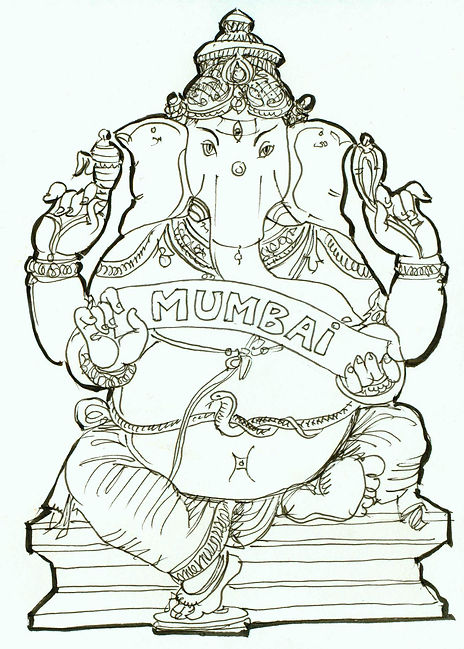
HERMANN GUNDERT
02/04/1814 - 04/25/1893
Historian, theologian, teacher, missionary, linguist, writer and publisher
As one of the early missionaries of the Basel Mission, Hermann Gundert founded a mission station in Malabar in what is now Kerala in southern India. His extraordinary talent for languages and his intensive preoccupation with "the country and its people" enable him to create important works in the Malayalam language used by the Keralese. This includes not least his folkloric and historical publications, his Malayalam grammar, his Malayalam-English dictionary, which has become a standard work, as well as the translation of the Bible and numerous hymns into Malayalam.
The British colonial government appointed him early in 1857 as school inspector for the provinces of Malabar and Kanara. His influence on curricula and upbringing in South India is still clearly visible and tangible today: every child knows his name. In 2000, in Thalassery, where he had lived for most of his stay in India, a monument nearly ten meters high was erected out of gratitude for him.
Hermann Gundert worked for the Calwer publishing association for over 30 years as a publisher, writer and theologian. He left his extensive knowledge in numerous documents that were digitized by the University of Tübingen with the support of the German research community and made available to the public.
Publications
Hermann Gundert worked for the Calwer Publishing Association as a publisher, writer and theologian for over 30 years. He left his extensive knowledge behind on numerous documents, which were digitized and made available to the public by the University of Tübingen with the support of the German research community.
The Hermann Gundert estate at Tübingen university library contains printed and lithographed books and pamphlets in Malayalam, Kannada, Tulu, Tamil, Telugu, Sanskrit and other languages, Indian manuscripts including several palm-leaf manuscripts, copies of texts and notebooks in various languages by Hermann Gundert and his missionary colleagues.
HERMANN GUNDERT AND HIS GRANDSON HERMANN HESSE
Hermann Gundert conveyed his enthusiasm for Indian culture in particular to his grandson Hermann Hesse (1877-1962). The two "Hermänner" had a close bond and it was not uncommon for the grandson to sit with his grandfather and carefully listen to the fascinating stories from India.
Their special relationship also becomes clear in the following video when Hermann Hesse breaks off his stay at the Maulbronn seminar and flees home to his grandfather.
Hermann Hesse used his knowledge of Indian culture in Siddhartha - an Indian poem that was not published until 1922, after Hermann Gundert's death. Hermann Hesse wrote this book, which today even Indians appreciate as a "cultural asset" without ever having been to India.
Thanks to Gundert's grandson Hermann Hesse, the family tradition lives on to a large extent in literature - both in German and in many of the world's languages into which Hesse's works have been translated. For Hermann Hesse, the grandfather was the central authority figure in the family, whom he described not only in Siddhartha as the ferryman Vasudeva, but also as the music master in the Glasperlenspiel (1943). In the memory of Grandfather (1952) and the autobiographical fairy tale Childhood of the Magician (1923) he portrayed him impressively.


Hermann Hesse
about his grandfather Hermann Gundert
"He, the old, venerable, mighty man, with a white beard, omniscient, more powerful than father and mother, he was in possession of completely different things and powers, his was not just the Indian toys and gods, all that carved and painted, Consecrated with magic, coconut cups and sandalwood chests, hall and library, he was also a magician, a knower, a sage. He understood all the languages of men, more than thirty, maybe also those of the gods, maybe also the stars, he knew Pali and Write and speak Sanskrit, he could sing Canarese, Bengali, Hindostan, Sinhalese songs, knew the prayer exercises of the Mohammedans and Buddhists, although he was a Christian and believed in the Triune God, he was in eastern, hot, dangerous countries for many years and decades had been, had traveled on boats and in ox-carts, on horses and mules, no one knew as he did that our city and our country were only a very small part of the population de was that a thousand million people believed differently from us, had different customs, languages, skin colors, different gods, virtues and vices than we did. I loved, adored and feared him, I expected everything from him, I trusted him to do everything, from him and his disguised god Pan in the garb of the idol I learned incessantly. "
Childhood of the Magician, Frankfurt 1974, p. 99
THE POET HERMANN GUNDERT
After the death of his mother, Hermann Gundert wrote the following poem at the age of 19:
On August 12th, 1833
That evening is coming
Should I complain?
That the sun goes
Tired of day's work
That the clouds are all around
Dark shadows draw,
That the stars descend
Flickering in the silence of the night?
[...]
You stand on the threshold
Of your century!
Here the cradle where you cried
There the worlds that await you!
And the accomplished ones above,
Waving to happier work,
And the entrusted below,
Wavering in honest striving!
Raise your right hand
Which you once gave her,
That the battle-tested
Help to the last step! -
The ever beloved!
But leave the left
And your warning eye
And love's memory flame
The younger pilgrims!
CONTACT
We look forward to the contact and exchange!
Your Hermann Gundert Society

